19 November 2024 - In the wards of Dr Muhammad Waasim Maaz Hospital, also known as Bab al Salama Surgical Hospital in Azaz, northwestern Syria, healthcare workers face a complex challenge every day: treating patients suffering from infections complicated by antimicrobial resistance (AMR). Despite limited resources, they continue to provide care to their community, encountering stories that reflect both the vulnerabilities and resilience of those they treat.
Zeina’s journey to recovery
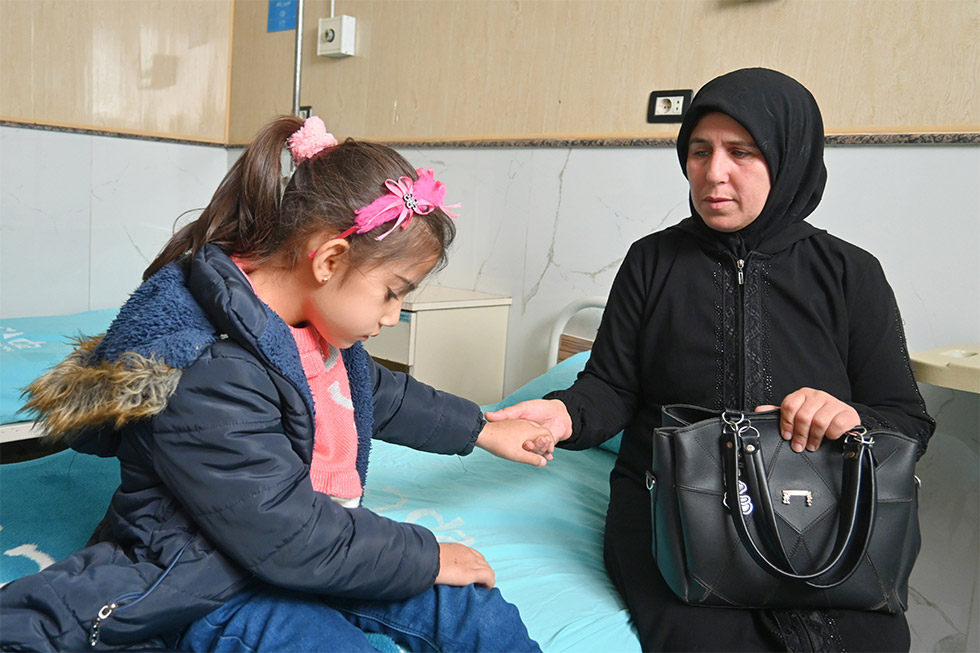 Zeina Saleh, along with her mother, at the Bab al Salama Surgical Hospital in Azaz, northwestern Syria. Photo credit: WHO/Mrinalini Santhanam
Zeina Saleh, along with her mother, at the Bab al Salama Surgical Hospital in Azaz, northwestern Syria. Photo credit: WHO/Mrinalini Santhanam
Six-year-old Zeina Saleh arrived at Bab al Salama Surgical Hospital with a persistent high fever, vomiting and other alarming symptoms. “Even the fever medicine didn’t help,” her mother recalls as she sits in the hospital’s isolation ward. Zeina was lethargic and unresponsive to light or sound, leaving her family deeply worried.
Dr Anas Al-Dhaher, a pediatrician specializing in neonatology, diagnosed bacterial meningitis after conducting a thorough examination and cerebrospinal fluid analysis. “It’s a serious infection, but we initiated treatment immediately,” he explains.
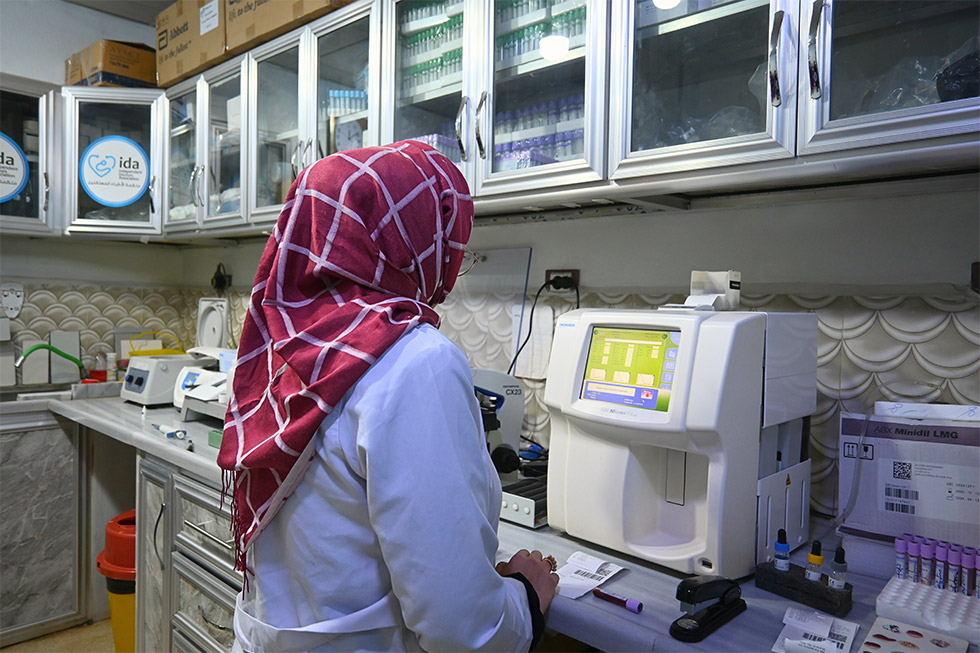 The Independent Doctors Association (IDA)-managed Bab al Salama Surgical Hospital’s testing lab within the main hospital. Photo credit: WHO/Mrinalini Santhanam
The Independent Doctors Association (IDA)-managed Bab al Salama Surgical Hospital’s testing lab within the main hospital. Photo credit: WHO/Mrinalini Santhanam
Despite their swift action, there were warning signs that the infection might be complicated by antibiotic resistance. “We noticed that after starting the standard antibiotics, there wasn’t the expected rapid response in her symptoms,” Dr Anas shares. “This delay made us suspect resistance might be a factor.”
Unfortunately, without access to culture testing at the hospital, confirming resistance was not an option. Families in Azaz often cannot afford private lab fees, leaving doctors to rely on clinical observations and standardized protocols. “Our emergency protocols always include culturing, but it is not available in our hospital. It’s only available in private labs, but it’s expensive. Also, it’s often inaccurate,” says Dr Anas.
The medical team adjusted Zeina’s treatment to include broader-spectrum antibiotics to ensure coverage for resistant strains, guided by WHO recommendations.
Over the next two days, Zeina’s condition improved noticeably—her fever subsided, and she began to eat and engage with her surroundings again. “She completed the full 14-day course and was discharged in good health,” Dr Anas adds.
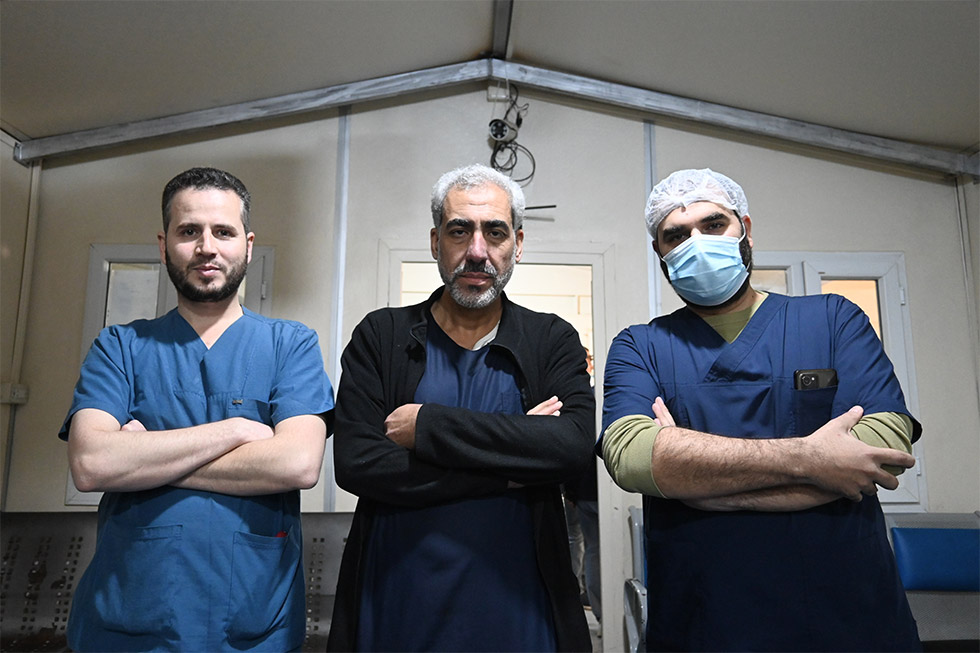 Left to right: Dr Husam Abob Alward, Dr Naser El Yousef and Dr Fares Al Shadidy, who work at the Bab al Salama Surgical Hospital. Photo credit: WHO/Mrinalini Santhanam
Left to right: Dr Husam Abob Alward, Dr Naser El Yousef and Dr Fares Al Shadidy, who work at the Bab al Salama Surgical Hospital. Photo credit: WHO/Mrinalini Santhanam
Zeina’s case underscores the challenges healthcare workers face in managing infections in northwest Syria. Antimicrobial resistance complicates these situations, as doctors often must use broad-spectrum antibiotics due to the lack of diagnostic tools. This approach, while necessary, increases the risk of resistance in the long term.
For Zeina’s mother, the experience was eye-opening. “I learned not to give antibiotics without consulting a doctor. It’s something I want other parents to know,” she says.
In Azaz and similar communities, misuse of antibiotics is a common problem. Many people bypass doctors altogether and purchase antibiotics directly from pharmacies without prescriptions. Others start antibiotics at the first sign of illness but stop as soon as they feel better, failing to complete the full course. Such practices allow bacteria to survive and evolve, making future infections harder to treat.
Facing complications head-on
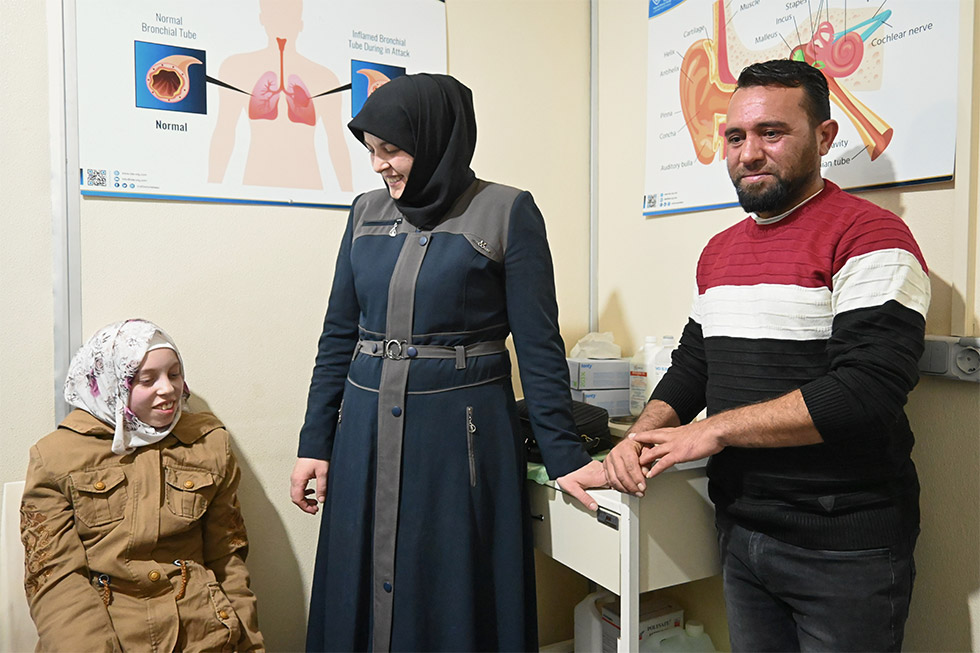 Layal Sheikh, with her mother Azab and father Abdullah, at the Bab al Salama Surgical Hospital. Photo credit: WHO/Mrinalini Santhanam
Layal Sheikh, with her mother Azab and father Abdullah, at the Bab al Salama Surgical Hospital. Photo credit: WHO/Mrinalini Santhanam
Fifteen-year-old Layal Sheikh’s story highlights the strain antimicrobial resistance places on health care systems. Layal underwent emergency surgery for a suspected abdominal tumor, but her recovery took a complicated turn. Post-surgery, she developed a severe infection.
“The initial antibiotics didn’t work, likely due to resistance,” explains Dr Naser El Yousef, the lead surgeon who managed her case. The medical team recommended a culture test to identify the most effective antibiotics.
While waiting for the results the team adjusted Layal’s treatment, cautiously introducing higher-generation antibiotics. This approach was paired with strict infection control measures to ensure that resistance did not worsen. “We took a careful, stepwise approach, escalating antibiotics only when absolutely necessary,” says Dr Naser.
Over the course of several weeks Layal’s infection began to subside. Her condition stabilized and she was eventually discharged in good health, much to her family’s relief.
For Layal’s father, the ordeal was a lesson in the importance of timely medical care.
“We tried home remedies at first, but they didn’t help. The doctors here were thorough and supportive and I’m grateful for their efforts,” he says.
Dr Naser reflects on the challenges healthcare workers face in managing antimicrobial resistance. “Without access to adequate resources like culture tests and referral systems, we are often navigating in the dark. It’s critical to have the right tools to provide timely and effective care,” he says.
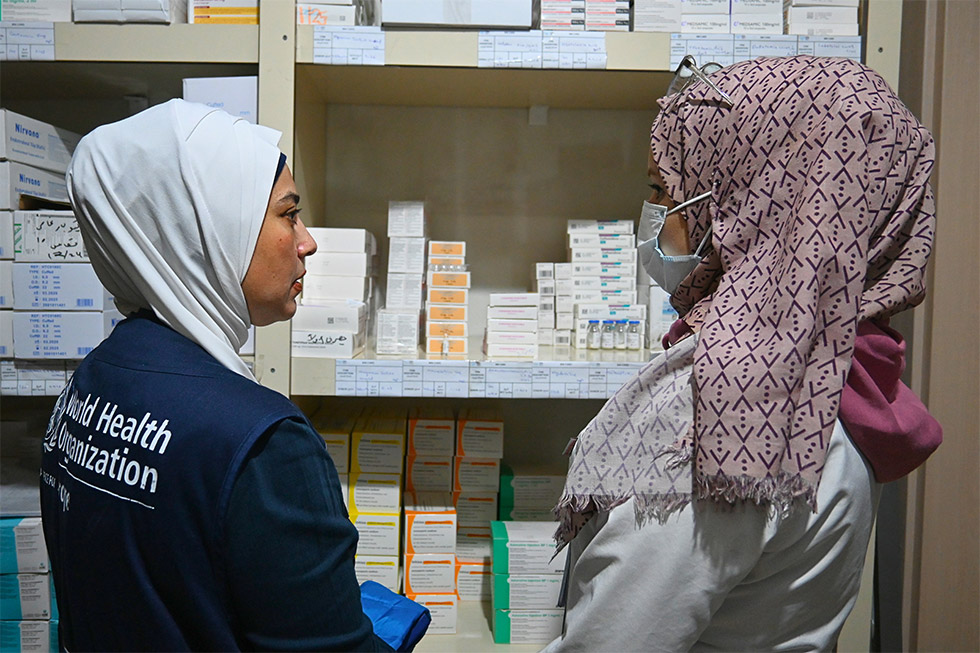 WHO monitors the distribution of antibiotics and advocates for responsible use while in discussion with the pharmacist at the Bab al Salama Surgical Hospital. Photo credit: WHO/Mrinalini Santhanam
WHO monitors the distribution of antibiotics and advocates for responsible use while in discussion with the pharmacist at the Bab al Salama Surgical Hospital. Photo credit: WHO/Mrinalini Santhanam
WHO monitors the distribution of antibiotics and advocates for responsible use while in discussion with the pharmacist at the Bab al Salama Surgical
WHO has been instrumental in addressing these gaps by training healthcare workers like Dr Naser and Dr Anas to effectively manage resistant infections, enhance infection control practices across healthcare facilities, and educate patients. With support from USAID’s Bureau for Humanitarian Assistance (BHA), WHO trained over 600 healthcare professionals in 2024 alone and plans to continue advocating for responsible antibiotic use, patient education, and regular testing to ensure that patients like Layal and Zeina can access quality, specialized care when needed.
The human cost of antimicrobial resistance
Each patient’s experience sheds light on the growing challenge of antimicrobial resistance in conflict-affected areas like northwestern Syria. Limited resources and the misuse of antibiotics complicate efforts to manage infections effectively.
Healthcare workers like Dr Anas and Dr Naser do more than treat illnesses – they educate families and promote practices that help prevent resistance.
“We make a point of explaining the importance of completing medication courses and seeking medical help early,” says Dr Anas.
For patients and families, these lessons are invaluable.
“I’ve learned to trust the doctors and follow their advice,” says Layal’s father. “It’s the best way to protect our children.”


